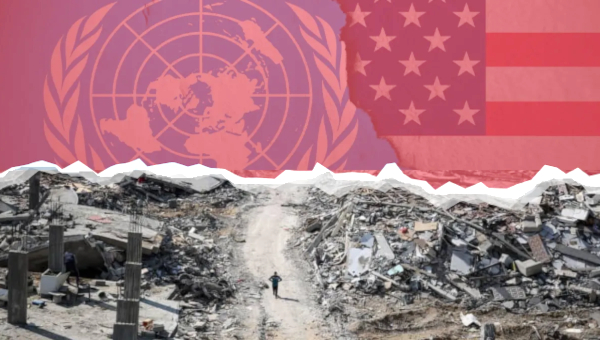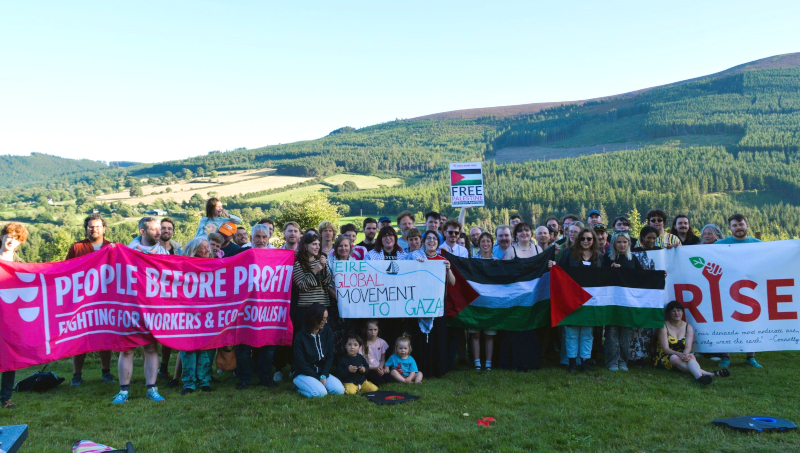A Continental Campaign for Living Wages and Social Justice
A coalition of Mexican unions and social movements has been calling for a continental workers’ campaign for a living wage and social justice in the three NAFTA (North American Free Trade Agreement) countries. The original call was made in November 2006 (see Bullet No. 49). It is being followed by new efforts to develop this campaign (see below). It emerges in the context of the impasses of the North American labour movement and the continuing competitive pressures on wages and incomes of working people.
Capitalism, by its very nature, pits individual workers and different labour forces against each other in the search for jobs. It also promotes competition among workers through a variety of strategies.
The two-tier workplace strategy (discussed in Bullet No. 85) is a good example of how this is carried out within plants and within a single industry. It also promotes this competitiveness through the cultural promotion of individualism and consumerism. As well, capitalist enterprises take advantage of pre-existing differences and tensions between groups (ethnic groups,
different nationalities, men/women, domestic-born/immigrant), to enhance their divide and rule strategy. These strategies have always been an important part of capitalism.
During the postwar Keynesian period in the U.S. and Canada and the ISI (Import Substitution Industrialization) period in Mexico, workers in oligopolistic sectors were able to insulate themselves from the general competition and make some very important gains in terms of wages, working conditions and benefits. However, these forms of sectoral labour solidarity (craft and industrial unions) always left out major sectors of the working class. Their exclusion was not simply the result of the sectoral focus of unions; it was also due to the aggressive resistance to the unionization of workers in the competitive sectors of the economy by capital and the state. The competitive pressures from the low wage, insecure, unhealthy labour conditions of the competitive sector are coming to be shared by all workers, especially young workers.
NAFTA and Labour Market Competition
The geographical extension, through export processing zones and NAFTA, of continental production systems to include Mexico enhances the possibilities of using competition between workers as a tool of labour control. Both the threat and practice of relocation, along with increasing casualization of the labour force, have been parts of an intertwined dual strategy that has transformed the conditions of work in all three NAFTA countries and increased managerial power. It has been part of the move to neoliberal regulation of labour which includes increased management power over workers (flexibility), lean production, weakening or destroying unions, reducing wages, and deterioration in health and safety standards and practices. This assault on workers’ rights, wages, and working and living conditions did not start with NAFTA. But NAFTA deepened, widened, and gave international treaty support to these neoliberal practices. Neoliberalism and NAFTA are aimed at reducing labour costs and increasing labour discipline and productivity. However, the use of the threat or practice of relocation as a tool of capital to discipline workers is not new nor is it unique to cross-border or international situations.
Relocation of manufacturing plants – or just the threat of it – has long been a weapon in capital’s struggle against workers. Jefferson Cowie has described this well in his study of RCA, Capital Moves: RCA’s 70-Year Quest for Cheap Labor (1999), in which he traces RCA’s moves from Camden, New Jersey to Bloomington, Indiana to Memphis, Tennessee and finally to Ciudad Juárez, to escape unions and keep wages down. The wage disparities and anti-union policies of many states within the U.S. that motivated RCA’s moves pale in comparison to those disparities between the U.S. and Mexico. The race to the bottom in terms of wages, working conditions, and democratic rights of workers is relentless. But it is not a race propelled by the “natural” workings of the market. It is being shaped and propelled by corporate and governmental policies that express themselves in actions ranging from plant-level threats and intimidation to international treaties and new international organizations that can even discipline governments.
There are fundamental processes of transformation going on in the American working class. For one, the weight of immigrants and Latinos has sharply increased. Secondly, neoliberalism is destroying a key component of the bourgeois hegemony over the working class, the belief in social mobility and a constantly improving standard of living within and between generations. The polarization of incomes, working and living conditions, and life opportunities in the U.S. means that discontent will continue to grow. This discontent has the potential to be the basis for a renewed left and labour movement. It also has the potential to be the basis for the growth of anti-immigrant chauvinism among the working class. The potential for progressive and class conscious responses among the working class will depend on the presentation of meaningful alternatives for solidarity and struggle.
That battle is always ideologically difficult inside the imperialist powers. But there is a great difference between the present moment of imperialism and earlier ones. In earlier periods, the profits of imperialism often allowed important sectors of the working class to make gains. The import of cheap resources and the export of manufactured goods from the imperial power raised the standard of living and employment opportunities for important sectors of the working class in the imperial power. But the present moment of imperialism involves shifting jobs globally and generalized competitive pressures that lead to declining wages and working conditions.
Mexican Workers Under Attack
Mexican workers have not gained by the relocation of plants to Mexico. The government of Mexico and its capitalist class has carried out similar – and even more brutal – policies against workers and peasants as those carried out in the U.S. and Canada. The impact of these policies has been even more devastating for Mexico than the rest of North America. Bad jobs, low wages, and unsafe working conditions in old Mexican plants were replaced by even worse jobs, lower wages and more unsafe conditions as plants in central Mexico were themselves either relocated to the northern maquila zones or wiped out by opening Mexico up to U.S. competition.
The public sector has also been sharply cut back and the very limited social net is being shredded. Real wages of Mexican workers have fallen dramatically. And, in the first 14 years of NAFTA, at least one million peasants lost their livelihoods as a result of neoliberal and NAFTA reforms. The pauperization of the Mexican working class, peasantry and parts of the middle sectors brought about by neoliberalism and NAFTA have compelled huge numbers of Mexicans to leave their homeland for economic survival. And they have come to play a more and more important role within the U.S. working class. Latinos, and especially Mexicans, now make up a significant and growing proportion of the U.S. working class.
Mexican Workers and a Continental Campaign
This deep integration of the Mexican working class in U.S. industrial production and services has important implications for the development of working class movements in both countries, for there are now many Mexican working class families that are simultaneously part of two working classes in contiguous nations. The Mexican working class is unique among the three working classes of North America in that it straddles the border of two countries. Even though there is still significant labour market segmentation based on ethnicity and national origins, there is now an increasing mingling of working people. The Mexican working class is a trans-national working class and provides a trans-national reserve army of labour. When millions of immigrant workers carried out their massive “A Day without Immigrants” protest on May 1, 2006, the events were received with much discussion and great enthusiasm at Mexico’s large May Day rally of independent unions. Mexican workers in the U.S. could be a key bridge between the struggles of the working class in both the U.S. and Mexico.
This spring will be a period of intense social conflict in Mexico. The authoritarian neoliberal government of President Felipe Calderon is determined to push through its agenda for the privatization of oil and electricity and to smash workers and union rights even more through changes in labour law. Unions and popular forces are preparing to fight back as witnessed by the massive peasant mobilization against NAFTA at the end of January and the two one-day strikes in February by the 70,000 Oaxacan teachers fighting for union democracy and against ongoing oppression.
The call by a coalition of progressive Mexican unions and social movements 16 months ago for a common struggle to raise wages in all three countries could be a start for the building of bridges of class-wide solidarity between workers in all three NAFTA countries. Since the original call, things have progressed slowly but now there is the possibility of taking a big step forward. A group of Latina/o activists and academics in the Los Angeles area are organizing the 34th Annual Conference of the Southwest Labor Studies Association (SWLSA) in Pomona from May 15-17, 2008 and have decided to have the proposed continental campaign as the theme of a plenary session. As well, there will be a meeting that week-end of all those interested in exploring the idea of a continental campaign, if possible, or at least of beginning ongoing dialogue between workers, unions, immigrant, community, and popular organizations in all three countries to discuss how to build a continent-wide struggle.
In Mexico City, the 5th Dialogo Nacional has just been held, sponsored by some of the same organizations that proposed the continental living wage campaign. Several thousand people were in the auditorium of the SME (Sindicato Mexicano de Electricistas – power workers) representing around 150 labour and popular organizations. In addition to the 60,000 member SME, there was the APPO (Popular Assembly of the Peoples of Oaxaca), the CNTE (National Coordinating Committee of Workers in Education, a national alliance of dissident teachers within the authoritarian national teachers union), the Frente Sindical Mexicana (a coalition of progressive unions), the Frente Nacional Contra la Repression, and many other organizations, large and small, from all parts of México. There was an enthusiastic response to the proposal to revive the continental campaign. Martin Esparza, the secretary-general of the SME, said he would attend the California meeting, as did others. This is a good moment to begin the discussion of workers fighting back continentally, as well as locally and nationally.
The call for the Pomona conference is presented below. Details of the meeting to discuss the idea of the continental campaign will be sent out later. We’d like to encourage all of you and your
organizations to attend both the conference of the Southwest Labor Studies Association and the meeting to discuss a continental campaign. Please consider making proposals for participation
in the conference of the SWLSA (deadline for proposals is March 15). The conference is an attempt to bring together community activists, trade unionists, immigrant rights activists, and intellectuals
to discuss working class experience and struggle.
Southwest Labor Studies Association
34th Annual Conference May 15-17, 2008
California Polytechnic University
Pomona, CA
CALL FOR PAPERS, WORKSHOPS, AND PRESENTATIONS
Working and Organizing Everyday: Workers, Families,
and Communities in Local and Global Struggles
Featuring: Plenary Sessions on The State of Working Families in the Inland Valley and The Struggle for a Continental Living Wage
Global economic transformations coupled with U.S. imperial policies have radically transformed the working and living conditions in communities across the globe. We invite proposals from scholars and community activists for panels, interactive workshops, performances, displays, art, film, and music that explore the local and global impacts of these processes and how workers and communities are challenging them.
Topics may include, but are not limited to:
- Historical and contemporary discussions of working class movements
- Immigrant worker organizing
- Global resistance to neoliberalism
- Impact of NAFTA and CAFTA on workers and communities
- Labour education
- Nativism and anti-immigrant movements
- Gender, race, and sexuality in organizing
- Youth and student activism
Proposal deadline is March 15, 2008. Please send a short (1-2 paragraphs) proposal and the name and contact information of the participants to Enrique C. Ochoa at ecochoa@csupomona.edu at CLASS Dean’s Office, Cal Poly Pomona, Pomona, CA 91768. For further information contact Enrique Ochoa at (909) 869-3115 or ecochoa@csupomona.edu.





